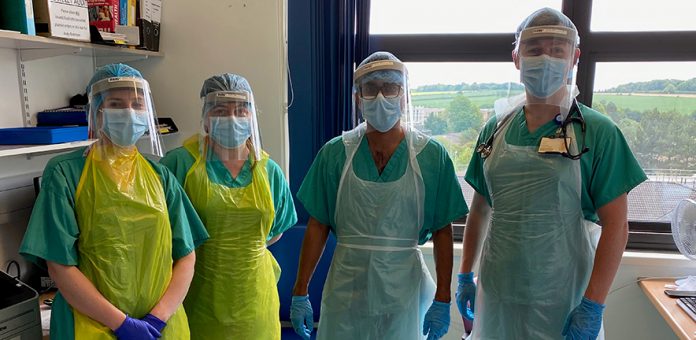I work at the Cambridge Institute of Therapeutic Immunology and Infectious Disease (CITIID) in the Department of Medicine. We have stayed operational throughout the COVID-19 pandemic. I was impressed by the way CITIID came together, speeding up completion of our containment level 3 labs (designed to safely handle infectious diseases) by four to six months. This institute came alive at the time it was needed most, and our work spans basic science to diagnostics. Few places in the world have been able to do this.
I’m used to working with another killer disease that creates a lot of fear. I’m a virologist, and I’ve spent the last decade studying HIV. The work I’ve done has been useful preparation for the COVID-19 pandemic, so it felt like the team was in the right place at the right time. Both HIV and COVID-19 are multi-system diseases, and HIV is still enigmatic after 30 years. As we discover the effects of COVID-19 on the human body, such as patients developing heart problems and lung damage, it looks like it will have far-reaching implications that will take a long time to sort out.
We wanted to use our expertise as virologists to help tackle COVID-19. We made ‘pseudo-viruses’ that are part coronavirus and part HIV, but are very safe and don’t cause disease, to try and understand how antibodies were working in people infected with the virus. By taking blood samples from COVID-19 patients and mixing them with our pseudo-virus, we could see that these patients had immunity that would prevent our virus infecting their cells.
One of the big problems with COVID-19 has been making a diagnosis quickly. Tests are being sent off to a lab and taking two to four days to come back, and that’s not quick enough. We’ve been trialling a new rapid point-of-care test to look for antibodies in patients – and we needed the corresponding lab-based study to understand how well this was working. We’re now about to implement a point-of-care antibody test to help diagnosis.
We’ve also recently introduced a new rapid diagnostic test called SAMBA II at Addenbrooke’s Hospital. This followed a four week clinical study we did in April that showed using this test was quick and effective, and that it had a very significant impact on preserving hospital capacity and patient safety. The SAMBA II machines were developed by a University of Cambridge spinout company called Diagnostics for the Real World. You take the nose or throat swab for people who you think have COVID-19, and get a result back in 90-minutes.
The lab has also started a programme to understand the basis of the second, inflammation-mediated part of the disease. This is likely to involve macrophages – the white blood cells that locate disease particles in the body and engulf them. We’re trying to understand the effects of low oxygen levels on the way macrophages behave, and find out why some patients get so much inflammation in their lungs that it becomes fatal. We’re also looking at whether drugs such as azithromyin and chloroquine can stop the inflammation – so not working directly on the virus, but trying to stop the body reacting against itself.
I think there are three big challenges posed by the pandemic: developing wide-scale rapid tests to keep track of the virus and control outbreaks, designing a vaccine that works throughout time and over long periods, and finding effective treatments. The virus is probably going to be circulating for some years, but it may mutate. So even if we have a vaccine we need to make sure it carries on working. We also need really good treatments in order to test vaccines. For a lot of diseases we can give someone a vaccine, and then infect them with the disease to see whether the vaccine works. But while we don’t have any good treatments for COVID-19, we can’t do that.
This has been a big team effort involving lots of people. We’re collaborating with the MRC Laboratory for Molecular Biology, and with colleagues in the Department of Pathology. There are also many people who switched the focus of their research to join us – some were interested in viruses, some were immunologists, but most were not coronavirus experts. Before COVID-19 there were very few of those.
The pandemic has shown us that we can make huge strides in understanding things very quickly and then deal with them appropriately, when we try. We need to communicate well, prepare early, and work together for a common goal. I hope we can all learn from this experience. The experience of the interaction between scientists and government is also something we can learn from.
In the future I want to keep doing COVID-19 research alongside the HIV research. This is partly because there’ll be plenty to do, and partly because I think there’s lots to learn that could translate to other viruses. The next pandemic may be a related virus, so we really do need to keep plugging away.
When the pandemic is over I’m looking forward to travelling again, for work and pleasure. I have projects in South Africa and I want to be back there to get them restarted. That’s where I see the need for our work on both HIV and COVID-19.
Ravi Gupta has been Professor of Clinical Microbiology at the Cambridge Institute for Therapeutic Immunology and Infectious Diseases since 2019. Deployment of the SAMBA II rapid diagnostic testing machines in Addenbrooke’s Hospital was reported here, and in a BBC interview, in April 2020.















